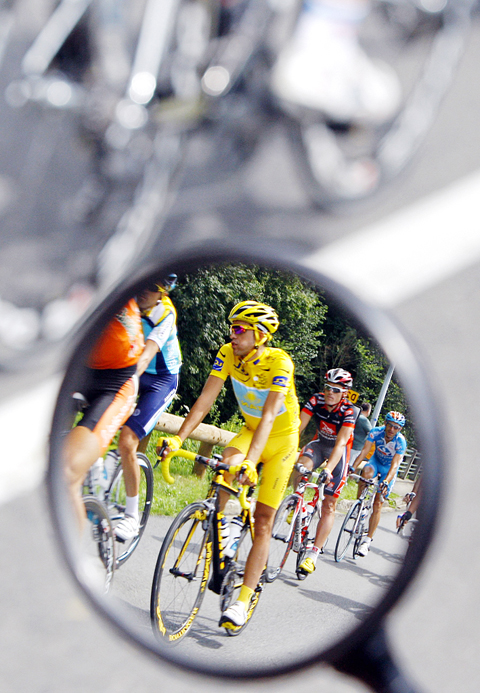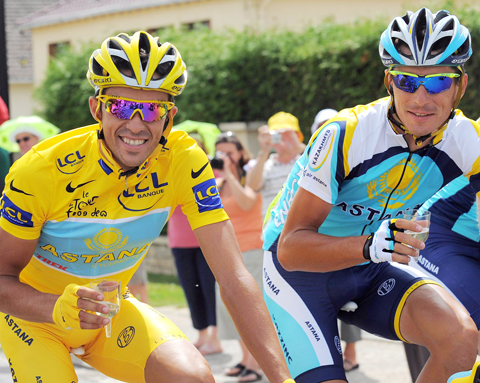Alberto Contador won the Tour de France for a second time on Sunday, while Lance Armstrong capped his return to the race with an impressive third-place finish.
Mark Cavendish of Britain collected his sixth stage win of this year’s Tour in a sprint after the 164km ride from Montereau-Fault-Yonne to the Champs-Elysees in Paris.
Over nearly 3,500km and 21 stages of racing over three weeks, Contador repelled many challenges in the mountains, excelled in the two time-trials — winning a pivotal race against the clock in the 18th stage — and won the first Alpine stage.

PHOTO: REUTERS
Andy Schleck of Luxembourg, Contador’s biggest rival among title contenders in the mountains, was second overall.
Contador, the 2007 champion, also had to battle a rearguard action within his Astana team, where the comeback of Armstrong to the Tour after three and a half years of retirement raised questions about who would be the team leader.
“It has been an especially difficult Tour for me, but I savor it and it is more special because of it,” Contador said after the prize ceremony.

PHOTO: EPA WARNING: EXCESSIVE CONSUMPTION OF ALCOHOL CAN DAMAGE
The subtext to the race was the open tension between Armstrong and Contador within Astana — a battle of egos between a proven cycling giant and another making the strong case that he’s one too.
The body language on the winner’s podium said it all. As he climbed onto the victor’s stage, Armstrong gave a perfunctory handshake to Contador, then heartily shook Schleck’s hand.
The quintessential American competitor cast a long sideways glance at the victor’s bowl as Contador took it and only gave a quick glance at his own crystal trophy.
Then Contador was greeted with a recording of the Danish national anthem because of an embarrassing mistake on the part of organizers.
The 26-year-old took off his cap and stood at attention while the wrong anthem played, looking off to the side at one point and occasionally breaking into a grin, images broadcast on public Spanish television TVE showed.
When the victory ceremony was repeated, this time with the Spanish anthem, the more up-tempo Royal March military tune, Contador smiled broadly and held his cap over his heart as he looked ahead.
The television station said Contador, the 2007 Tour champion, himself alerted tour organizers of the error, which it called a “serious mistake.”
Earlier, massive crowds poured out onto Paris’ most famous avenue for the finish — Norwegians in Viking helmets, flag-waving Britons and an American in a stars-and-stripes top hat among them.
By the end of the race, Armstrong was talking less of squabbling within Astana and more about Contador’s greatness as a rider — and admitted his form wasn’t the best.
“I’m realistic. I did everything I could,” Armstrong said before the final stage. “For me, and even more for my kids, it’s probably a healthy thing for them to see, because they saw their dad that never lost and the kids in their class [say]: ‘Your dad never loses,’ so it’s good for them to see dad get third and still be cool with that and still be happy.”
Asked on French TV what the hardest moment in the race had been, Contador replied: “It was in the [team] hotel,” without elaborating.
Contador and Armstrong reportedly had differences early in the race, as tensions grew over who was the No. 1 Astana rider.
“We are totally incompatible. In the end, Armstrong will go his way and I’ll go mine,” Contador said.
Some old habits died hard for the Texan. On the ride into Paris, Armstrong — reviving a habit from his heyday — sipped champagne in the saddle, only this time it was to celebrate Contador’s win and their collective win as a team.
Armstrong and Contador both took a few sips and posed with glass in one hand, handlebar in the other, but then tipped away the rest of the bubbly half-drunk and threw away the glasses.
The Spaniard did enjoy this victory more than in 2007. Four days from the finish that year, then race leader Michael Rasmussen of Denmark was sent home for lying about his whereabouts during pre-Tour doping controls.
“In the key stages of this Tour, I found myself feeling more at ease than I did in 2007, but in situations outside of racing, I didn’t feel so comfortable,” Contador told Spanish broadcaster TVE.
After Oscar Pereiro’s victory in 2006 and Carlos Sastre’s last year, the Tour has been won by a Spaniard for four straight years.
Contador began the Tour on July 4 as the pre-race favorite. At only 26 years old, he is already one of cycling’s greats, having won all three Grand Tours of France, Italy and Spain.
He had to sit out last year because of a doping scandal at Astana before he joined.
Contador finished in 85 hours, 48 minutes, 35 seconds. The race looped from Monaco, across the Mediterranean rim into Spain, up the Pyrenees, diagonally across central and northeastern France to the Alps and then down to Saturday’s race climax on the dreaded Mont Ventoux in southeast France, before the Paris finish.
Schleck was 4 minutes, 11 seconds behind. Armstrong was 5 minutes, 24 seconds back.
After three straight Tours decided by less than a minute between first and second place, Contador’s margin of victory was the largest since Armstrong collected his last title in 2005.
The 24-year-old Schleck won the white jersey awarded to the Tour’s best young rider. Franco Pellizotti of Italy picked up the polka-dot jersey given to the race’s “King of the Mountains.”
Armstrong, the 37-year-old seven-time Tour champion, is the second-oldest rider to reach the Tour podium. Raymond Poulidor of France was 40 when he placed third in 1976.
Cavendish set his own record — no rider has ever won six Tour stages in a sprint — but Thor Hushovd of Norway beat the 24-year-old Briton for the green jersey given to the Tour’s best sprinter.
Cavendish made it look easy, winning by several bike lengths in the last mad dash, was followed in second by his own lead-out man on the Columbia team, Mark Renshaw. Tyler Farrar of the US was third.
“For sure, winning on the Champs-Elysees is a dream for every single sprinter — to see the Arc de Triomphe in the distance,” said Cavendish, acknowledging it would have been a “bonus” to take home the green jersey. “I can’t go home from this Tour being disappointed — I won six stages.”

Freddie Freeman homered and drove in four runs, Shohei Ohtani also went deep and Roki Sasaki earned his first major league win as the Los Angeles Dodgers beat the Atlanta Braves 10-3 on Saturday night for their seventh straight victory. The Dodgers have won the first two games of the series to improve to 5-0 against Atlanta this year. Los Angeles’ three-game sweep at home early in the season left the Braves 0-7. Sasaki allowed three runs and six hits over five innings. The 23-year-old right-hander gave up a home run to Ozzie Albies, but received plenty of offensive support in his

Bayern Munich on Sunday were crowned German champions for the 34th time, giving striker Harry Kane his first major trophy, after second-placed Bayer 04 Leverkusen drew 2-2 at SC Freiburg. Bayern’s 3-3 draw at RB Leipzig on Saturday, when the Bavarians came from two goals down to take the lead before conceding a stoppage-time equalizer, meant defending Bundesliga champions Leverkusen needed to win at Freiburg to delay the title party. Leverkusen were two goals down before scoring twice in the final 10 minutes, but Xabi Alonso’s side could not find a third, as Bayern reclaimed the title at the first attempt after

INTER AWAIT: Superb saves by PSG ’keeper Gianluigi Donnarumma inspired the victory, as Arsenal were punished for misses, including one by Bukayo Saka Arsenal on Wednesday fell short on the big stage again as their painful UEFA Champions League semi-final exit against Paris Saint-Germain left Mikel Arteta to rue his club’s failure to provide him with enough attacking options. Arteta’s side were unable to reach the Champions League final for the first time in 19 years as PSG clinched a tense 2-1 win at Parc des Princes. Trailing 1-0 from last week’s first leg in London, the Gunners made a blistering start to the second leg, but could not convert their chances as Gianluigi Donnarumma’s superb saves inspired PSG’s 3-1 aggregate victory. Arsenal were punished for

THRILLER: Raphinha gave Barca a 3-2 lead with two minutes remaining of regular time, but Francesco Acerbi equalized the game in the second minute of added time Davide Frattesi on Tuesday fired Inter into the UEFA Champions League final with an extra-time winner that gave the Italians a stunning 4-3 triumph over Barcelona, 7-6 on aggregate. Italy midfielder Frattesi won a tie for the ages under a downpour in Milan when he lashed home in the 99th minute, sending a packed and rocking San Siro wild with joy. Simone Inzaghi’s team will face either Arsenal or Paris Saint-Germain at the end of this month in Munich, Germany, where they would feel they have a great chance to be crowned kings of Europe for a fourth time after